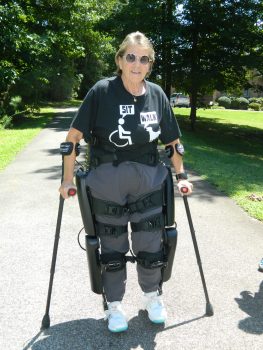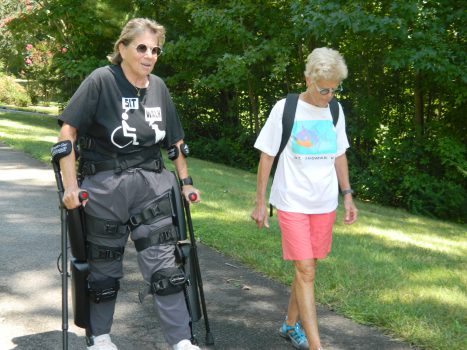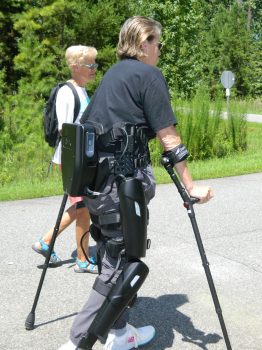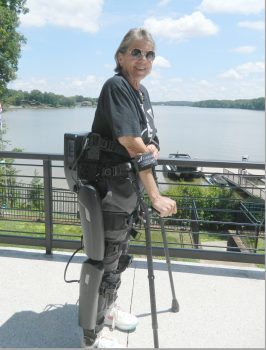‘They changed my life’: ReWalk Exoskeleton helps resident walk
Published 12:10 am Saturday, August 17, 2024
SALISBURY — “I’m blessed.”
Those are the words that Caren Landis of Salisbury used to describe her life both before and after getting her ReWalk Personal Exoskeleton mobility device and with it, being able to take those first steps after 10 years of not being able to walk.
Landis shared that she had a bike accident, but doesn’t focus on her past and said, “I’m broken and I’m under repair.” She now looks with gratitude at what she does have and to her future.
Her journey toward getting her device, or as she has named it, Luke ReWalker, began before she was contacted by those at Lifeward. It was 2017 and she was participating in a Burke Rehab study in New York.
She said they have some fabulous people there at Burke Rehab and they suggested she try the study and she agreed. It wasn’t the ReWalk, she noted, but a different version and it was heavy, awkward and hard and she just didn’t think she could do this.
“I know I only did it for those months, but I couldn’t see it as a life moving forward,” Landis said.
In 2023, she received a phone call and the person on the other end greeted her with “hey there, how are you doing?” And Landis replied with, “Who are you?”
The answer on the other end was “my name is Michelle Wilson Price and I’m with ReWalk (now Lifeward). Would you like to try it?’
Landis’ mind went back to her experience in 2017, and therefore she said no. Price, who had found her through that study, told her of the advancement of the devices and that her life could be wonderful.
“I have a fabulous life,” she said, sharing that she has people in her life who love her, Becky Wilborn who she said has been in her life for 35 years, her family and her dogs. Plus she leads a very active life playing pickleball at least five days a week and both water skis and jet skis, and she can’t imagine it being more fabulous.
“Don’t you want to walk?” Price asked her, and after pausing, Landis responded that it would be nice, but then adds, that “it’s not the end all, which people don’t understand. People think that my life is miserable because I can’t walk. It’s not. I’ve made peace with it. I have moved on, which allows me to live my life really to the fullest.”
Price told her that her life could be better and encouraged Landis to give the device a try.
It was Sept. 26, 2023, that Landis said she first met Luke ReWalker during her first rehab session at Atrium Health Cabarrus Outpatient Physical Therapy in Concord. She said she was excited at this point.
Landis, Wilborn and another friend, a retired physical therapist who wanted to see this device, went to the rehab session and it was there she also met Price an occupational therapist and her team of Lauren Dudas, a physical therapist from Colorado and Kaitlin Luffman and Kelly Rachmiel, therapists at Atrium, who Landis said, “learned when we learned. It was a learning experience for all of us and they are top notch. I’ve had a lot of physical therapists and they are top notch.”
All of these people she has met through this journey she said have been amazing and are accessible to her when needed. In addition to the therapists, she also mentioned Wai Lee, who quickly came from Texas and repaired Luke when she had an issue with one of the circuit boards, as she noted how amazing he was as well.
She went to rehab three times a week for 90 minutes from September through January and in January she was able to take Luke home, “and it was very exciting,” Landis said.
This was not possible until Wilborn, Landis’ support system, could do all that the therapists knew how to do with checklists for both of them to accomplish.
Therapy continues weekly for Landis, along with regular checkups for Luke, to make sure he is in good shape, she said.
On her first therapy session, she said it was scary, but the team was there encouraging her and walking along with her. She took videos of that first milestone occasion.
“Kelly and Kaitlin never gave up on me. They constantly would look at, we videoed, and see where I made a mistake where other people wouldn’t think to video,” Landis said.
She has her own videos of her therapy sessions and pointed out that in November her confidence and speed had built up.
“I can tell you what every inch of the floor at the physical therapy clinic looks like. I know it like the back of my hand and the front of my hand because I would stare at it and now I don’t have to,” Landis said.
When she first started walking with Luke in her neighborhood, she said she was intimidated by things in the road, keeping a watch on it and not looking up.
While she does scan for debris and sticks and things that might cause her to slip now, she doesn’t let things scare her anymore when she walks.
“Now I don’t care what I step on. I know where every crack is. I know where everything that is in the street is. I just stay aware,” she said.
She can do the same when they walk in the village green because they know it well, but Landis did mention that sidewalks make her uncomfortable because they are uneven.
“I could get over them,” she said, “but then I really have to concentrate.”
Therapy affords Landis the opportunity to work on areas that are difficult as she said ramps are hard, but for her the “absolute hardest thing for me to do is go up a curb because it’s one curb and there’s no railing to grab, depending on the crutches,” she said. “I still go back and work on that. I can do it, but I get there and go, ‘it’s a curb, it’s a curb.’”
But she doesn’t let this stop her, she said, “because it will stop me. So I keep on going,” and that is just one of the lessons she learned during her time in therapy. Others include keep trying, keep going, and you will never learn if you don’t fail.
Landis pointed out that learning with her buddy Luke ReWalker has been a step by step process as she noted several issues they had to take care of along the way including learning about a graceful collapse.
She said they teach you how to gracefully fall, something she is trying to avoid doing, just in case something goes wrong and it shuts down. When that happens, you go into a sitting position and you just gracefully sit on the floor, she pointed out.
“It’s very slow, but it scares you when you hear collapse and you’re wearing an extra 65 pounds,” she said.
Landis relayed the story of when this did happen to her. It was a day when she and Wilborn were walking in the neighborhood, and all of a sudden she realized something was wrong.
Feeling one leg start to buckle, she called out that she was going down and had to be lowered to the ground with a straight leg as Luke had turned off. There she was, she said, laying on the side of the road, thankful for not much traffic there, saying, “I’m a speed bump.”
Unable to unbuckle Luke because of the awkward position, they weren’t sure what to do when a neighbor came driving up and looking out his window said, “so is this Luke?” And Landis tells him, yes, this is Luke, and we have become a speed bump.”
All of them start laughing at this point and with his help they get her out of the device and both she and Luke into his vehicle and back home.
After contacting the company, they sent her a new battery and discovering this was not the issue, Lee quickly came and took care of the problem with the circuit board.
“I think just knowing that the company is there to back you up is a really big deal for me,” Landis said. “I love that.”
They laugh about the speed bump episode now, Landis said, as she mentioned their life has been filled with laughter.
Built to her specs, she said the machines can be made to fit you but “you can’t be so big,” as she demonstrated with her hands and emphasizing the ‘so’ and it depends on the level of injury, where you’re hurt from. as she noted her injury is low. Plus, she said, you have to have the use of your hands and arms.
The ReWalk Robotics Exoskeleton has a wrist controller with many functions, but, she said, you can hit the buttons on the controls and use the bypass mode and control directly on the leg and thigh panels.
Having Luke ReWalker has given Landis some advantages she said, including her bones get stronger and the blood flows better, plus there’s a feeling of normalcy as she works in the kitchen at the counter and can pivot and go from one end to the other and not have to have the cutting board in her lap or on a table, and she can pivot by leaning to one side and inching around in tight spaces or to turn around on walks.
And, she said with a laugh, “when you’re broken and you’re standing, a lot of things can change for you. The first time I stood, I was so tall. I haven’t been five foot six inches in years.”
She also pointed out the various control panels, charger and other features that Luke has to help her with balance and support and the computer which among its features can show how many steps she takes, which she shared are not as important as the fact that she is taking those steps.
“I feel sorry for people who don’t have support,” Landis said, as she praised all who supported her along the way including Wilborn and all involved with the company, telling how amazing they all are.
And if Price were to call today and ask about the device, Landis said, “there’s no way I could thank her. What she did for me changed my life. What ReWalk has done for me has changed my life. What Lauren Dudas out in Colorado has done for me has changed my life. What Kelly and Kaitlyn have done for me and continue to do for me because I go there twice a week, they change my life every single day. They’re my every week lifeline to staying afloat.”
Note: The following was shared from Landis who received it from Lifeward/ReWalk.
“On April 11, 2024, Medicare finalized its reimbursement for personal exoskeletons. ReWalk is the first personal exoskeleton to have received Medicare coverage for an eligible beneficiary based on that individual’s medical necessity. Lifeward (previously ReWalk Robotics) is proud to have achieved this milestone and is committed to improving access to life-changing technology for more people living with SCI. With this final determination, medically eligible beneficiaries are able to pursue the benefits of walking again with confidence and clarity in the reimbursement pathway.”









